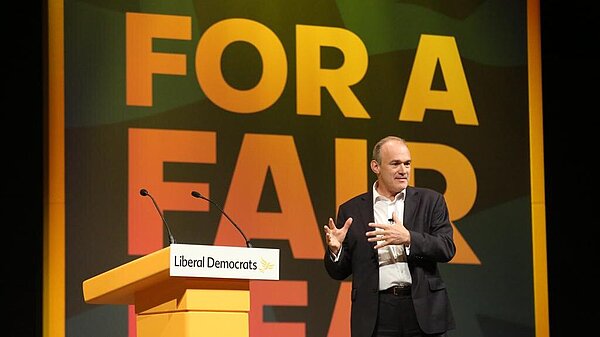Backing Hospitality for Growth and Jobs
F12 - Policy Motion
Motion as passed by conference
Conference recognises that:
- Hospitality businesses such as pubs, restaurants, cafes and hotels make a hugely significant contribution to our national economy, local economies, and the night–time economy alike.
- Beyond their economic significance, hospitality businesses make invaluable social and cultural contributions to our communities, breathing life into our high streets and town centres.
- A thriving hospitality sector is vital for boosting economic growth, job creation and people’s wellbeing.
Conference notes with concern that:
- For years, hospitality businesses have been facing monumental challenges, including workforce shortages, the Coronavirus pandemic, a broken business rates system, the energy crisis and the economic mismanagement of the previous Conservative Government.
- The current Government has added to these challenges by introducing an unfair increase to Employer’s National Insurance Contributions (NICs), which disproportionately impacts hospitality by raising the NICs rate while also reducing the salary threshold on which it is levied, significantly raising the cost of employing part–time workers.
- According to a survey by UK Hospitality, as of June 2025, one–third of responding hospitality businesses are operating at a loss, six in ten have had to cut jobs, while 63% have had to reduce the hours available to staff.
- The UK Government’s business rates changes, which lower the rate of relief for Retail, Hospitality and Leisure firms from 75% to 40% while abolishing the cap limiting support to £110,000 per firm, will effectively see small independent bricks–and–mortar businesses subsidise the profits of large corporate chains, who can claim relief across multiple sites.
- In 2016, the Competition and Markets Authority (CMA) found that ineffective competition in the energy market was adding £500 million a year to SME energy bills, and a lack of effective competition was again confirmed by Ofgem in 2023 – yet this did not result in a market investigation by the CMA.
- Hospitality jobs often require staff members to leave during evenings and night hours, while a recent YouGov poll found that 66% of women feel at least sometimes unsafe walking home at night.
- According to UK Hospitality, despite more than 54% of hospitality employees being women, they make up just 30% of leadership positions.
- A recent survey by the Bristol food union found that 71% of Women in hospitality were considering leaving the industry due to lack of progression and pay.
Conference reaffirms Liberal Democrat commitments to:
- Boost small businesses and empower them to create new local jobs, including by abolishing business rates and replacing them with a Commercial Landowner Levy.
- Encouraging businesses, especially SMEs, to invest in training, take up digital technologies and become more energy efficient.
Conference therefore calls on the Government to recognise the importance of hospitality in boosting our economy, creating jobs and supporting local high streets and communities by:
- Exempting hospitality SMEs from the employer’s National Insurance increase.
- Consulting on the creation of a new employer’s National Insurance Contributions band from £5,000 to £9,100 with a lower rate, to lower the cost of employing part–time staff.
- Ensuring that the upcoming Review of Electricity Market Arrangements (REMA) includes concrete measures to give hospitality businesses access to better and cheaper energy deals.
- Instructing the CMA to open an investigation into the non–domestic energy market and recommend any appropriate remedies.
- Urgently correcting the anomaly in its business rates changes to ensure that large chains will not benefit at the expense of small and independent hospitality businesses.
- Tackling skills shortages in the hospitality sector by speeding up reform of the broken apprenticeship system and empowering Skills England to act as a properly independent body, with employers at its heart.
- Backing initiatives that aim to increase women's representation in hospitality leadership positions, such as mentorship networks and leadership programs.
- Introducing greater support for individuals with childcare responsibilities, including those who work in the hospitality industry.
- Introducing greater protections for women who report sexual harassment in the workplace, and to educate workers and young people on their rights to report sexual harassment in the workplace. Conference further calls for Liberal Democrats to advocate for greater protections for women and girls working in hospitality travelling home late at night.
Applicability: : Federal except for a) (lines 39–41) , 5. and 6. (lines 59–65) which are England only.
Motion Prior to Amendment
Submitted by: 12 party members
Mover: Daisy Cooper MP (Spokesperson for the Treasury).
Summation: Sarah Olney MP (Spokesperson for Business).
Conference recognises that:
- Hospitality businesses such as pubs, restaurants, cafes and hotels make a hugely significant contribution to our national economy, local economies, and the night–time economy alike.
- Beyond their economic significance, hospitality businesses make invaluable social and cultural contributions to our communities, breathing life into our high streets and town centres.
- A thriving hospitality sector is vital for boosting economic growth, job creation and people’s wellbeing.
Conference notes with concern that:
- For years, hospitality businesses have been facing monumental challenges, including workforce shortages, the Coronavirus pandemic, a broken business rates system, the energy crisis and the economic mismanagement of the previous Conservative Government.
- The current Government has added to these challenges by introducing an unfair increase to Employer’s National Insurance Contributions (NICs), which disproportionately impacts hospitality by raising the NICs rate while also reducing the salary threshold on which it is levied, significantly raising the cost of employing part–time workers.
- According to a survey by UK Hospitality, as of June 2025, one–third of responding hospitality businesses are operating at a loss, six in ten have had to cut jobs, while 63% have had to reduce the hours available to staff.
- The UK Government’s business rates changes, which lower the rate of relief for Retail, Hospitality and Leisure firms from 75% to 40% while abolishing the cap limiting support to £110,000 per firm, will effectively see small independent bricks–and–mortar businesses subsidise the profits of large corporate chains, who can claim relief across multiple sites.
- In 2016, the Competition and Markets Authority (CMA) found that ineffective competition in the energy market was adding £500 million a year to SME energy bills, and a lack of effective competition was again confirmed by Ofgem in 2023 – yet this did not result in a market investigation by the CMA.
Conference reaffirms Liberal Democrat commitments to:
- Boost small businesses and empower them to create new local jobs, including by abolishing business rates and replacing them with a Commercial Landowner Levy.
- Encouraging businesses, especially SMEs, to invest in training, take up digital technologies and become more energy efficient.
Conference therefore calls on the Government to recognise the importance of hospitality in boosting our economy, creating jobs and supporting local high streets and communities by:
- Exempting hospitality SMEs from the employer’s National Insurance increase.
- Consulting on the creation of a new employer’s National Insurance Contributions band from £5,000 to £9,100 with a lower rate, to lower the cost of employing part–time staff.
- Ensuring that the upcoming Review of Electricity Market Arrangements (REMA) includes concrete measures to give hospitality businesses access to better and cheaper energy deals.
- Instructing the CMA to open an investigation into the non–domestic energy market and recommend any appropriate remedies.
- Urgently correcting the anomaly in its business rates changes to ensure that large chains will not benefit at the expense of small and independent hospitality businesses.
- Tackling skills shortages in the hospitality sector by speeding up reform of the broken apprenticeship system and empowering Skills England to act as a properly independent body, with employers at its heart.
Applicability: : Federal except for a) (lines 39–41) , 5. and 6. (lines 59–65) which are England only.
Amendments
Amendment One
PASSED
Submitted by: Liberal Democrat Women
Mover: Rebecca Jones
Summation: Cllr Donna Harris
After v). (line 37), insert:
vi) Hospitality jobs often require staff members to leave during evenings and night hours, while a recent YouGov poll found that 66% of women feel at least sometimes unsafe walking home at night.
vii) According to UK Hospitality, despite more than 54% of hospitality employees being women, they make up just 30% of leadership positions.
viii) A recent survey by the Bristol food union found that 71% of Women in hospitality were considering leaving the industry due to lack of progression and pay.
After 6. (line 65), insert:
7. Backing initiatives that aim to increase women's representation in hospitality leadership positions, such as mentorship networks and leadership programs.
8. Introducing greater support for individuals with childcare responsibilities, including those who work in the hospitality industry.
9. Introducing greater protections for women who report sexual harassment in the workplace, and to educate workers and young people on their rights to report sexual harassment in the workplace. Conference further calls for Liberal Democrats to advocate for greater protections for women and girls working in hospitality travelling home late at night.



